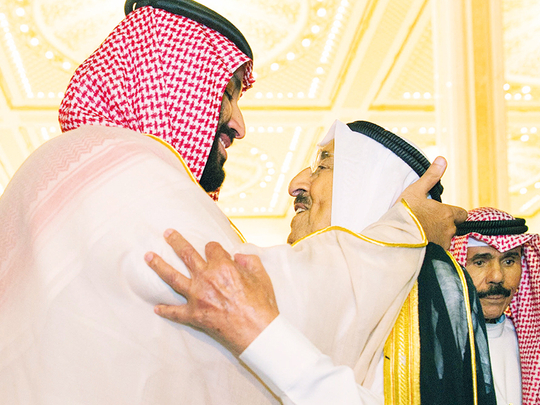
Manama: Kuwait and Saudi Arabia have affirmed the strong ties binding them and their keen interest in consolidating their cooperation.
Saudi Crown Prince Mohammad Bin Salman arrived on Sunday evening on a short visit to Kuwait for talks with the Emir Shaikh Sabah Al Ahmad, Crown Prince Shaikh Nawaf Al Ahmad and other senior officials.
Prince Mohammad, making his first visit to a Gulf country since he became crown prince, was accorded a grand welcome.
The two countries discussed ways of boosting bilateral relations in all domains, as well as regional and international developments, according to official accounts by their news agencies.
The meeting at Al Bayan Palace in Kuwait City also covered “efforts to support common Gulf action”.
No details about other topics on the agenda of the talks were provided, but speculation was high that the meeting covered the resumption of oil production at the Neutral Zone’s jointly operated oilfields, mainly Khafji which was shut in October 2014 for environmental reasons and Wafra which has been down since May 2015 due to operating difficulties.
The resumption of production at the two oilfields could add up to 500,000 barrels per day of oil output capacity to both countries and thus help raise output amid declining Iranian supplies hit by US sanctions and calls to increase oil production to bring crude prices down.
Oil prices rose to their highest since 2014 above $80 per barrel and a steep decline in Iranian oil exports because of new US sanctions coupled with declines in Venezuela production have prompted concerns in several countries.
On Saturday, King Salman Bin Abdul Aziz received a phone call from President Donald Trump during which they discussed “efforts to maintain oil market supply and stability and to ensure the growth of the global economy.”
With political and security developments unfolding at a tremendous pace in the region, Riyadh is increasingly keen on convergent attitudes in the Gulf towards US actions vis-à-vis Iran and Tehran’s possible reaction, especially if it threatens regional security and stability.
Prince Mohammad’s visit is likely to stress the importance of common stances, according to observers.
Kuwait lowered its diplomatic relations with Iran in January 2016 and recalled its ambassador, saying the decision had been taken following “the storming, torching and sabotage activities carried out by a group of demonstrators on the Saudi Embassy in Tehran and its consulate in Mashhad”.
Kuwait blames Iran for its interference in the domestic affairs of Gulf countries, including Kuwait.
“Iran should take concrete steps to change its policy and adopt a positive role in the region,” Kuwaiti officials said.
Last week, Kuwait reiterated it would not reinstate its ambassador unless Tehran reviewed its policy.
Also likely on the agenda of Saudi-Kuwaiti talks are the latest developments in Yemen and in Syria and the situation within the GCC, according to observers.
Bahrain, Saudi Arabia and the UAE, in addition to Egypt, in June last year severed their diplomatic, trade and travel relations with Qatar after they accused it of supporting extremists and funding terrorism despite the pledges it made in the Riyadh Agreement.
The four countries issued a list of demands that Qatar rejected as it dismissed the accusations.
Mediation efforts, led by Kuwait and supported by the US and several other countries, have not succeeded in making any breakthrough.












